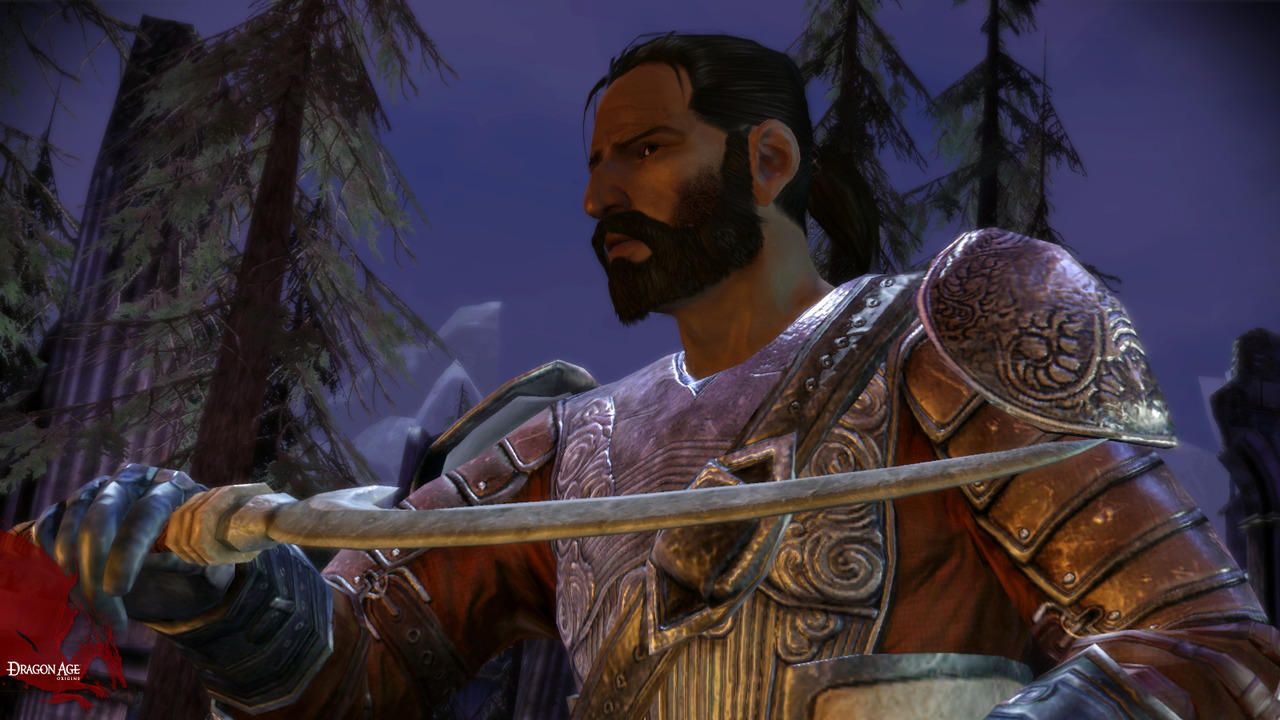So when I saw that they had another RPG out even before Mass Effect 2, I knew I had to give it a try.
I never posted a "First Impressions" article for Dragon Age: Origins because I found that, when it came time to do my reviews, they sounded a lot alike unless my opinion totally changed from beginning to end, so this time I decided to just do a review. And this review has been a *long* time coming, because this game is *huge*. This is not a game that you play for 10-15 hours and then take the disc out and never try again. No, for me it was 65 hours later, and I even started it again a couple of times (for achievement purposes mostly). I was immersed in this world for a couple of hours a night most of the week, and even longer on weekends. That being said, while Dragon Age: Origins has all the same rich detail and juicy RPG goodness of most Bioware games, I was not as impressed this time around. It became a slog to get through in the middle part of the game, and the final confrontation is just incredibly hard.
(Click on screen images to enlarge)
You have an amazing number of customization options for your character as well, as you can adjust hair, face, eyes, eyebrows, skin tone, even the height of your eyes (are they in the center of your face or higher up?). If you don't want to customize your character that much, there are a number of presets for each race and gender that will do fine.
Once you're done with all that, you get thrown into your origin story. If you're a Mage, you start out at the Circle of Mages Tower, going through your initiation. If you chose a Dwarven Lower Caste, then you are among the dregs of Dwarven society and you have to follow that origin story. Thus, you can start the game six different times and the first hour or two of gameplay will be totally different (though some origin stories are more beefed up than others).
All origin stories lead to the same point, however, when you are recruited by Duncan, head of the Grey Wardens of Ferelden. The Wardens are tasked with safeguarding Ferelden from what's called "The Blight," where demonic Darkspawn roam the world and try to destroy everything. The dwarves are always fighting them underground but when they come to the surface, that's when you know things are bad. You join Duncan and Ferelden's king at the ruined city of Ostagar to stop the Darkspawn in their tracks. But things don't turn out quite the way you had planned, and eventually it's up to you to save Ferelden. Isn't that always the way?
Over the course of the game, you can be joined by a number of companions, all with different goals and motivations. You are the leader of this ragtag bunch, though, and what you say goes. However, they may not always agree with you, and it's even possible that one of them might attack you if they think you're wasting their time! You have to balance their needs and desires with what you think is the right thing to do.
As with most Bioware RPGs, you can either be a prick or a saint, or completely Chaotic Neutral (a term for you D&D fans!) and do whatever you want on a whim! That being said, it is possible to make it so certain quests don't become available to you if you piss off the wrong person, so be careful. As always, I chose to be a good guy (though a couple of times when the dialogue option of "Yes, your blathering is getting quite annoying, I agree" came up, it was tempting to take it). I find that often makes the easiest path through the game, though it can be fun to go back and play it over, being an asshole the entire time.
Another common factor in Bioware RPGs is the possibility of romancing some of your companions, and sexuality be damned on a couple of them! I love how the achievement for bedding Zoran is called "Easy Lover," because he's such a lech. You can improve your standing with any of your companions by going along with them when they think you should do something a certain way (Morrigan hates it when you're too much of a goody-two-shoes), but you can also improve it by giving them gifts that you can find or buy all around Ferelden. Certain gifts have bigger increases with certain people, so it's good to get an idea of what they like. It's not all about getting into their pants, either, as improving their opinion of you can give them skill and stats bonuses because of your "leadership" (if that's what you want to call it). It's an interesting facet of these RPGs, and Bioware generally treats the whole thing with maturity. Eventually, you can bed one or more of the companions, which leads to a short romantic cut scene that eventually fades to black.
Combat is done in real time, though you can always pause it to give other characters orders. This can be a bit cumbersome on the Xbox, however, and I've heard this control system is a lot easier on the PC. Each character has a number of "tactics slots" where you can tell them how to behave in certain situations, which makes things a lot easier because you can let them go and do their thing without you having to worry about them.
For example, you can have one of your warriors protect your mage, breaking off with whoever he/she is fighting to go attack the evil minion that's attacking your mage. Or you can have your character who's using a bow & arrow change to a melee weapon if somebody engages him/her in melee. That being said, I would suggest always controlling your mage yourself, because you know when the best time to cast which spell is, and it's very hard to do area effect spells (like a giant lightning storm) using the Tactics slots. Sometimes you have to precisely place area effect spells for maximum effectiveness (as well as to avoid damaging members of your party if you're playing with "friendly fire" on), and that's impossible with the AI. Overall, though, I did enjoy the combat.
There are definitely some tough battles in Dragon Age: Origins, though, so thankfully you can adjust the difficulty level in the middle of the game, finish this fight, and then adjust back to the level you were playing at. For example, there's one instance where you face a mirror image of your party. I had run out of Injury Kits and all of my characters had at least one major wound, and some had three or four (if a character "dies" in combat but you end up winning the battle, the "dead" characters revive and are just "wounded," and these wounds can affect skills, stats, and other abilities until they are healed, which you do with Injury Kits). Thus, I was totally outmatched until I bumped the difficulty level down.
Another major problem with this game, in fact the worst thing about it, is that it becomes a major slog to get through the middle part of the game. I found myself wearing down at times just wanting the story to move forward. As in most RPGs, there are lots of side quests to do in addition to the main quests, but unlike most RPGs, you don't always get experience points for completing them (other than the XP for facing whatever monsters you end up fighting). I hate "fetch" quests at the best of times (where some character wants you to go retrieve something for them, and it's usually all the way across town, or sometimes in another city!). However, I hate them even more when you don't get any reward for them! Oh, sure, you might get some money (though usually not much), but no XPs? That's incredible. There were a couple of times I had to force myself to get through the middle part of the game, occasionally taking a day or two off because the thought of doing more of the same just did not thrill me at all.
However, what kept me going was the strength of most Bioware games: the story and the characters. First, I wanted to see where my romance(s) would go, but I also wanted to see where the story would go. Each major area you have go to has a dilemma of some sorts going on, and sometimes you have to make a choice of which side in a conflict to support. Sometimes you can mediate and sometimes you can't. The story writing, as is usual for Bioware, is top notch and well worth finishing the game to see how everything turns out. Another cool thing is that the race and origin you chose way back at the beginning of the game will change some of the things later on. If you're a Dwarf, for example, then when you return to your home caves to recruit the Dwarves for the fight against the Blight, you will be treated a lot differently than if you were an Elf or a Human. I liked that aspect of the game too.
I have to say something about the graphics. For some reason, I just wasn't that impressed with them, though they're certainly not "bad." The characters are a bit blocky and the settings just don't have that awesome thrill that Mass Effect gave me. However, nothing is more satisfying than seeing the coup de grace in a battle where your warrior takes the head off of a Darkspawn and a fountain of blood comes spurting out. I do have to hand it to Bioware for attention to detail, too. If a cutscene happens right after a battle, your characters have a lot of blood spatter on their images. They're not instantly cleaned up like they would be in many other games.
The sound is very good, though. If you're fully armored and running around the screen, you hear the "clank clank clank" of the sword that's strapped to your back banging against your armor. The voice acting is pretty good, with Kate Mulgrew (Star Trek: Voyager) providing a couple of the voices. I loved Morrigan's voice as well as Alistair's (though I thought Alistair was an annoying, whiny wimp overall) especially.
Overall, I really enjoyed Dragon Age: Origins, though it's probably the least of the many Bioware games I've played so far. That's not a strike against this game, however; it's more of a compliment to all of their other games. I greatly enjoyed this game, with just the faults I mentioned above marring what was otherwise an enjoyable experience.






















0 comments:
Post a Comment
Note: Only a member of this blog may post a comment.